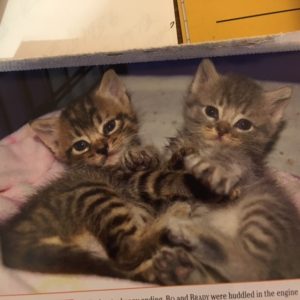 While most cats are…well, pussy cats, some seem to have been spawned by an evil Tasmanian devil cat. What makes cats aggressive? Why do some cats play so rough? What causes a cat to fight his way out of a good petting session? Do cats get mood disorders? Are some cats just naturally angry?
While most cats are…well, pussy cats, some seem to have been spawned by an evil Tasmanian devil cat. What makes cats aggressive? Why do some cats play so rough? What causes a cat to fight his way out of a good petting session? Do cats get mood disorders? Are some cats just naturally angry?
I’m not sure that anger is an issue as much as fear with some cats. But isn’t that where anger stems from in people? Fear? Does an aggressive cat need an anger management course? Unless you can get Jackson Galaxy to come to your home and have a serious talk with your cat, you’re pretty much on your own to figure out why your cat shows signs of aggression and how to manage it. I’m pretty sure the one thing you do not want to do is respond to aggression with aggression. First, let’s analyze the cat as best we can.
Consider his beginnings. A momma cat and siblings are more important to a kitten than  simply warmth and nourishment. Kittens learn a lot about how to be a cat in those early weeks. One thing he learns is how to play nice and that’s vital to his future. Kittens get cues from mom and siblings demonstrating how to play gentle. And when the kitten is adopted into a forever home, it’s up to us to continue that lesson by using our hands for petting, not for wrestling with the little guy. Use wand toys to play with a kitten. If you use your hand to play rough with a kitten, he is going to respond by biting and scratching—grabbing and chewing. Over time, this play can get out of hand and become a bit rowdy. If you wonder how your sweet kitten became a tiger cat, look to your play tactics.
simply warmth and nourishment. Kittens learn a lot about how to be a cat in those early weeks. One thing he learns is how to play nice and that’s vital to his future. Kittens get cues from mom and siblings demonstrating how to play gentle. And when the kitten is adopted into a forever home, it’s up to us to continue that lesson by using our hands for petting, not for wrestling with the little guy. Use wand toys to play with a kitten. If you use your hand to play rough with a kitten, he is going to respond by biting and scratching—grabbing and chewing. Over time, this play can get out of hand and become a bit rowdy. If you wonder how your sweet kitten became a tiger cat, look to your play tactics.
 So the number one reason why a cat might become ornery is because he lacked proper upbringing by his mom and didn’t get play-time with other kittens at a young age. Number two is you—or whoever adopted the kitten when he was young. Play gentle, use a toy instead of your hand for exuberant play and your cat will be less likely to use you as a pin cushion and a chew toy.
So the number one reason why a cat might become ornery is because he lacked proper upbringing by his mom and didn’t get play-time with other kittens at a young age. Number two is you—or whoever adopted the kitten when he was young. Play gentle, use a toy instead of your hand for exuberant play and your cat will be less likely to use you as a pin cushion and a chew toy.
What if we find ourselves at the claws and teeth end of cattitude—I mean negative cattitude? It happens. You might adopt an older cat who didn’t learn to play nice. Perhaps you’ve agreed to pet sit a difficult cat, you find yourself caring for a feral cat who wandered into your yard, or your grown child moves back in with a feisty kitty.
There are a variety of reasons why a grown cat “acts out.” He’s frightened, he’s territorial,  he’s an intact tom, he was taken from his mother too soon, or he’s in pain. You might notice that the cat doesn’t seek you out to terrorize you, but he may react with claws and teeth when you try to hold him tightly, take a treat from him, back him into a corner, or restrain him against his wishes. I know, sometimes it’s necessary. But if you have an aggressive cat, it will behoove you to learn techniques and tactics for when you must physically handle him.
he’s an intact tom, he was taken from his mother too soon, or he’s in pain. You might notice that the cat doesn’t seek you out to terrorize you, but he may react with claws and teeth when you try to hold him tightly, take a treat from him, back him into a corner, or restrain him against his wishes. I know, sometimes it’s necessary. But if you have an aggressive cat, it will behoove you to learn techniques and tactics for when you must physically handle him.
- First and foremost, have the cat neutered.
- If he’s afraid when your grandkids visit, make sure the cat has a safe place to hide from them. Honor his fear and the children’s safety.
- Learn what his triggers are and avoid those situations. Pay attention to what the cat is telling you. If his ears go back, his skin twitches, he’s flipping his tail, or growling, he isn’t happy with what you’re doing to him.
- Don’t try to make him work through the pain. Maybe he needs a vet check to see if he has a physical problem. If not, probably the cat harbors a fear you will never understand. So walk lightly, make him as comfortable as you can—so that he feels safe and calm. In time, he might actually enjoy brief periods of gentle petting or a little scratching around the neck. You might find he adores having you run your fingers softly over his fur or a vigorous scratching on top of his head.
- Take a lesson from an expert in how to physically handle this cat when need be. You don’t want to cause him undue stress.
 In case you haven’t learned it yet, that little fur ball you brought home—even the one that you’ve lived with for years now—is in charge. To keep peace in the family, most of us play by the cat’s rules. And this makes sense in many cases. But we can also help by not exacerbating the situation through teasing gestures, for example. Cats have been known to gentle down when treated with kindness and respect, although sometimes it can take a while.
In case you haven’t learned it yet, that little fur ball you brought home—even the one that you’ve lived with for years now—is in charge. To keep peace in the family, most of us play by the cat’s rules. And this makes sense in many cases. But we can also help by not exacerbating the situation through teasing gestures, for example. Cats have been known to gentle down when treated with kindness and respect, although sometimes it can take a while.
Now there are exceptions. We had a terrorist cat living in our neighborhood for a few years. Boy were we glad when his family moved. He was a small ginger cat with a huge bad-boy attitude. He fought with every cat in the neighborhood. He invited petting, but once you ran your hand over his fur, he’d attack with vengeance. He ripped screens trying to get to the indoor cats. He pulled a screen off of one neighbor’s window, went inside, and attacked their elderly Abyssinian while she slept in her little bed. She was okay—just shook up and with only a few battle scars. But he seemed to have another side. His owners said he was a sweet and gentle companion for their three small children. He slept on their beds at night. They adored this little two-faced rebel and had trouble believing he did the things we reported. I have to wonder if cats suffer from mood disorders because I think that cat needed to be medicated.
Let’s hope that all of your cats are sweet, gentle, loving beings. In case you find yourself at the paws of one who isn’t, here’s an article on better understanding the aggressive cat. http://cattime.com/cat-facts/lifestyle/97-causes-of-cat-aggression





